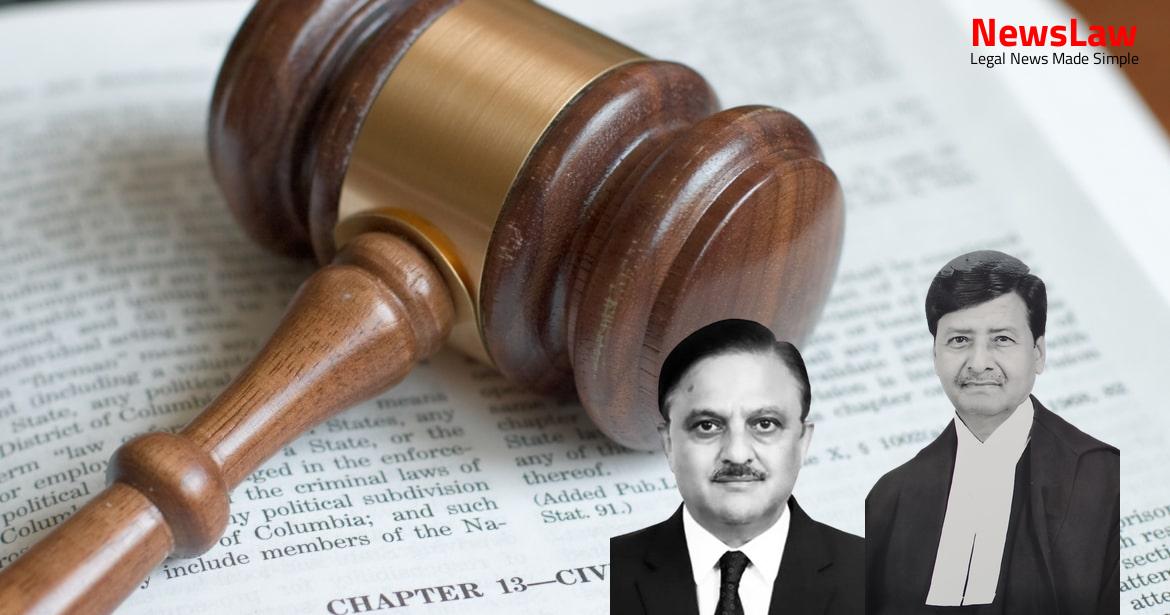Delve into the complexities of gratuity entitlement and legal interpretation as seen through the lens of a recent High Court case. The court’s analysis focused on the interplay between contractual schemes and statutory provisions, shedding light on crucial aspects of employment law and gratuity rights. Understanding these legal nuances is essential for grasping the implications of the court’s decision and its broader impact on employee benefits.
Facts
- The High Court stayed the operation of the challenged orders on 13.04.2018 upon the appellant furnishing a bank guarantee.
- The Appellate Authority dismissed the appeal on 23.03.2018, stating that the Gratuity Fund created by the appellant is a term of the service contract and is covered under Section 4(5) of the Act.
- On 31.07.2017, the Claim Petition was allowed by the Controlling Authority under the Act, stating that employees are entitled to receive higher gratuity amount under more beneficial settlements, awards, rules, or schemes of the employer.
- The Scheme at hand did not have a cap on gratuity amount, and the employees were paid higher amounts exceeding the limits provided under the Act.
- The applicant was entitled to full gratuity amount under the scheme without any ceiling as it was more beneficial.
- The calculation for the gratuity amount payable was based on the formula under the Act, resulting in Rs. 1,83,75,000/- to be paid to the applicant.
- The Writ Petition was disposed of by the High Court on 22.11.2017 with a direction for the appellant to submit a bank guarantee representing the gratuity amount along with interest.
- The emolument sheets indicated a contribution towards gratuity of 4.81% of the respondent’s basic salary, which increased significantly after his promotion to the post of Chief Executive Officer.
- The appellant challenged the Orders passed by the Authorities under the Act by filing Writ Petition No.3385 of 2018 in the High Court.
- The appellant claimed that after the Payment of Gratuity (Amendment) Act, 1994, all employees including the respondent are covered under the PG Act for gratuity calculation.
- The appellant sought the respondent to receive the remaining gratuity sum of Rs.1,73,75,000/- with interest at 18% per annum.
- The appellant referred to Clause 15 of the Trust Deed and Rule 6(b) of the Rules in response to the claim petition.
- The respondent issued a legal notice on 19.10.2012 and filed a Claim Petition under Section 7 of the Act asserting entitlement to a gratuity amount of Rs.1,83,75,000/-.
- The respondent’s last drawn wages were Rs.24,50,000/- per month when he resigned after about 12 years of service.
- A bank draft of Rs.10,19,452/- was forwarded to the respondent by the appellant for gratuity along with interest accrued.
Also Read: Legal Analysis on Arbitration Petition Limitation Period
Arguments
- Section 4(5) of the Act has overriding effect over other provisions of Section 4.
- As per the judgement in Union Bank of India, Section 4(5) would override the provisions of Section 3 of the Act.
- The respondent only needed to show that the appellant had a scheme for its employees (contract) without any prescribed ceiling.
- Such a scheme would be protected by Section 4(5) of the Act.
Also Read: Analysis of High Courts’ Jurisdiction and Court Orders Under Article 142
Analysis
- The Approved Gratuity Fund was constituted for providing gratuities to the employees of the company.
- Section 4(5) of the Act allows employees to receive better terms of gratuity under agreements with the employer.
- The Rules of the Fund dictate the administration and payment of gratuity upon termination of services.
- The Act sets out the criteria for gratuity payment based on the duration of service and salary bracket.
- Different sections of the Act have been amended over time to adjust the wage ceilings and payment calculations.
- Employees’ eligibility for gratuity is defined based on their roles and wages in the company.
- The Rules of the Scheme outline the rates and conditions for gratuity payment in various scenarios.
- The explanation to Section 4(2) details the calculation of gratuity based on wages.
- The case evaluated the parameters of gratuity entitlement based on the specific wage levels and service durations.
- The judgement compared the original text of the Act with the subsequent amendments to ascertain gratuity provisions.
- Section 4(5) of the Act protects the respondent’s right to receive gratuity under better terms than those prescribed in the Act.
- The Trust Deed and Rules do not limit the respondent’s entitlement to gratuity under the ceiling limit of Section 4(3) of the Act.
- The Scheme provides for the rates as per Section 4(2) of the Act without the upper limit under Section 4(3) of the Act.
- Rule 6(b) of the Rules stipulates that gratuity should be calculated as per the provisions of the Act for employees covered by the Act.
- The Trust Deed and Scheme differentiate between employees covered by the Act and those not covered by the Act.
- The intent of the Trust Deed and the Scheme is to govern the amount and rates of gratuity in accordance with the provisions of the Act for covered employees.
- The ceiling limit of gratuity under Section 4(3) of the Act has been successively raised over time.
- The terms of the Trust Deed and Scheme do not offer alternative terms to employees covered by the Act apart from what is payable under the Act.
- The Scheme emphasizes that employees covered by the Act shall receive gratuity in line with the provisions of the Act.
- The High Court’s failure to consider the impact of Rule 6(b) of the Scheme is noted.
- Respondent/workman must choose between the internal gratuity scheme of the employer or the ceiling limit under the PG Act.
- Reference to the case Beed District Central Cooperative Bank Ltd. where employees could not avail better terms of their contract with the employer and also request gratuity as per the PG Act.
- Decision in Beed District Central Cooperative Bank Ltd. reiterated that an employee must choose between the statutory provisions or the contractual scheme, and not combine elements of both.
- Employee must opt for either the beneficial provisions of the statute or the agreement, and not cherry-pick the best terms from both.
- Mistakes in making extra payments to some employees do not create a right for others.
- Appellant was correct in following provisions of the Act and the prescribed ceiling under Section 4(3).
- Authorities under the Act and the High Court were wrong in accepting the respondent’s claim.
Also Read: Electoral Malpractices in Mayor Election
Decision
- Appeal allowed
- Impugned judgment and order set aside
- Claim Petition dismissed
- No costs awarded
- Leave granted
Case Title: BCH ELECTRIC LIMITED Vs. PRADEEP MEHRA (2020 INSC 379)
Case Number: C.A. No.-002379-002379 / 2020



